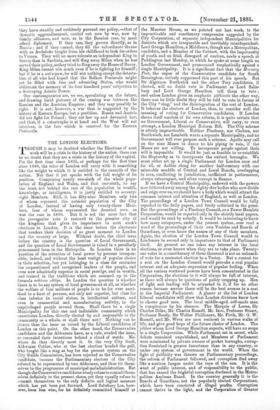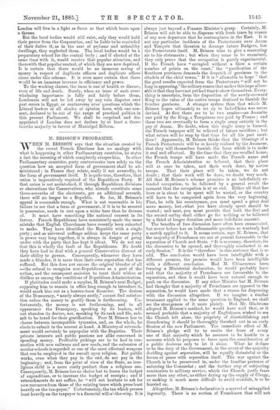THE LONDON ELECTIONS.
THOUGH it may be doubted whether the Elections of next week will be a crisis in the history of the nation, there can be no doubt that they are a crisis in the history of the capital. For the first time since 1835, or perhaps for the first time since 1688, the voice of London will carry with it something like the weight to which it is entitled in the councils of the nation. Not that it yet speaks with the full weight of its position. Comprising nearly one-sixth of the whole popu- lation of England and Wales, and that one-sixth, to say the least, not behind the rest of the population in wealth, knowledge, or intelligence, it is justly entitled to seventy- eight Members. Still, it has fifty-nine Members, only two of whom represent the outsider population of the City of London, instead of having only twenty-three Mem- bers, four of whom represented the deserted area, as was the case in 1880. But it is not the mere fact that the prerogative vote is restored to the premier city of the kingdom that gives its importance to next week's elections in London. It is the issue before the electorate that renders their decision of so great moment to London and the country at large. Without doubt, the chief issue before the country is the question of Local Government, and the question of Local Government is raised in a peculiarly pronounced form in the Metropolis. In London there is no question of the retention of local power by persons irrespon- sible, indeed, and without the least vestige of popular choice in their selection, but yet belonging to a class for centuries the unquestioned and recognised leaders of the people, and even now admittedly superior in social prestige, and in wealth, ' and trained in the traditions which are summed up in the formula noblesse oblige. In London the question is whether there is to be any system of local government at all, or whether the welfare of four millions of people is to be for ever sacri- ficed to a knot of persons, not only not superior, but class for class inferior in social status, in intellectual culture, and even in commercial and manufacturing activity, to the .unprivileged people around them. Shall there be a single 31unicipality for this one and indivisible community which constitutes London, directly elected by and responsible to the community as a whole, or shall there not ? Nothing can be clearer than the issue as raised by the Liberal candidates of London on this point. On the other hand, the Conservative candidates and the Aldermen have, as a rule, evaded the issue, or concealed their intentions behind a cloud of words. No- where do they directly meet it. In the very City itself, Alderman Cotton, who at the last election headed the poll, who fought like a stag at bay for the present system on the City Guilds Commission, has been rejected as the Conservative candidate, because the Parliamentary electors of the City refused to be represented by two Aldermen, and thus tie them- selves to the programme of municipal maladministration. But though the Conservative candidates wisely refuse to commit them- selves definitely to the present chaos, yet they equally refuse to commit themselves to the only definite and logical measure which has yet been put forward. Lord Salisbury has, how- ever, been less wise, for he definitely committed himself at the Mansion House, as we pointed out last week, to the impracticable and reactionary compromise suggested by the City Corporation, of separate independent Municipalities for districts which are inseparable and inevitably interdependent. Lord George Hamilton, a Middlesex, though not a Metropolitan, candidate, and a Member of the Cabinet, with the impetuosity of youth and an Irish disregard of caution, made a speech at Paddington last Monday, in which he spoke at some length on London Government, and pronounced emphatically against a single Municipality. It is a significant fact that the Morning Post, the organ of the Conservative candidate for South Kensington, entirely suppressed this part of his speech. But Sir Algernon Borthwick and the other Tory candidates, if elected, will no doubt vote in Parliament as Lord Salis- bury and Lord George Hamilton tell them to vote ; and unless London gives an emphatic plibiscite the other way, there can be little doubt they will be told to vote in favour of the City " ring," and the disintegration of the rest of London. It behoves the electors of London, then, to consider well the meaning of voting for Conservative candidates. If London shows itself careless of its own reform, it is quite certain that no Government, Liberal or Conservative, will carry, or even attempt, a London Municipal Reform Bill. The City scheme is utterly impracticable. Neither Finsbury, nor Chelsea, nor Southwark, nor Lambeth wants a separate Municipality, and no Government will ever propose such a scheme. Apollo may call on the nine Muses to dance to his piping in vain, if the Muses are not willing. To incorporate people against their will is impossible. It would be just as feasible to re-establish the Heptarchy as to incorporate the extinct boroughs. We must either set up a single Parliament for London once and for all, or dodder along for another half-century with our miserable muddle of Central and Local Boards, overlapping in area, conflicting in jurisdiction, inefficient in performance, always extravagant, and often corrupt in finance.
If we have a Central Municipality, endowed with the powers now frittered away among the eighty-five bodies who now divide and reign over us, we should have a body which would attract the common interest and attention of England, as well as London. The proceedings of a London Town Council would be fully reported in the daily papers, and freely criticised in the press. But the proceedings of a Finsbury Council, or a Tower Hamlets Corporation, would be reported only in the strictly local papers, and would be read by nobody. It would be interesting to know how many ratepayers, under the present system, ever read a word of the proceedings of their own Vestries and Boards of Guardians, or even know the names of any of their members. Again, the election of the London Town Council would to Londoners be second only in importance to that of Parliament itself. At present no one takes any interest in the local elections, or even knows when they are to take place. Twenty- one votes in a constituency of three thousand is not an unheard- of vote for a contested election to a Vestry. But a contest for a seat on the London Council would provoke a real popular interest and an adequate expression of popular feeling. When all the various scattered powers have been concentrated in the Corporation, the elections to it will always be full of interest, as there will always be questions of policy cropping up. Men of light and leading will be attracted to it, if for no other reason because service there will be the best avenue to a seat in the Imperial Parliament. A glance at the list of London Liberal candidates will show that London divisions know how to choose good men. The local middle-aged, self-made man is conspicuous by his absence. The Marquis of Lorne, Sir Charles Dilke, Mr. Charles Russell, Mr. Ince, Professor Stuart, Professor Beesly, Sir Walter Phillimore, Mr. Firth, Mr. G. W. Russell, and Mr. Wren are men eminent in various walks of life, and give good hope of the future choice of London. The jobber whom Lord George Hamilton expects, will have no scope in a single Corporation. While Parliament sat in secret, while debate remained unpublished, and Members of Parliament were nominated by private owners of pocket boroughs, corrup- tion flourished in greater luxuriance than in any country, or under any system of government in the world. When the light of publicity was thrown on Parliamentary proceedings, the reform of Parliament followed, and corruption died away like a noxious fungus under the rays of the sun. It is the want of public interest, and of responsibility to the public, that has caused the frightful corruption disclosed in the Metro- politan Asylums Board. In the country generally it is the Boards of Guardians, not the popularly elected Corporations, which have been convicted of illegal profits. Corruption cannot thrive in the light, and the Corporation of Greater London will live in a light as fierce as that which beats upon a throne.
But the local bodies would still exist, only they would hold their power from the Corporation, and be liable to be reminded of their duties if, as in the case of asylums and unhealthy dwellings, they neglected them. The local bodies would be a preparatory school for the central body ; and if elected at the same time with it, would receive that popular attention, and therewith that popular control, of which they are now deprived. It is certain that there would be an immense saving of money in respect of duplicate officers and duplicate offices alone under this scheme. It is even more certain that there would be an immense increase in efficiency and power.
To the working classes, the issue is one of health or disease, even of life and death. Surely, when an issue of such over- whelming importance is fully and fairly before them, Londoners will not be led away by any vain disputes over past errors in Egypt, or controversy over questions which the Liberal leaders of all shades of opinion have, with one con- sent, declared to be out of the range of practical politics in this present Parliament. We shall be surprised and dis- appointed if London does not declare by at least a three- fourths majority in favour of Municipal Reform.



































 Previous page
Previous page